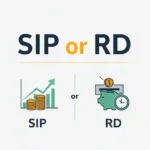Investing is one of the most important tools for building wealth over time. Whether you are an old investor or just starting, the age-old debate on stocks vs mutual funds is always relevant. Both offer unique advantages and cater to the different types of investors. To make an informed decision, it is crucial to understand how each works, their benefits, and the risks involved.
Understanding Stocks and Mutual Funds
What Are Stocks?
Stocks are portions of ownership in a company. Thus, when you buy a stock, you own a part of that company, no matter how small. Stock prices tend to move depending on the conditions of the market, companies’ performance, and market sentiment.
- Advantages of Stocks:
- High growth potential, especially for individual stocks in well-performing companies.
- Direct control over your investment portfolio.
- Dividends provide an additional income stream.
- Risks of Stocks:
- High volatility, with prices swinging dramatically in short periods.
- Requires time and knowledge to research and manage investments.
- Losses can be significant if the company underperforms.
What Are Mutual Funds?
A mutual fund pools money from a group of investors to invest in a diversified portfolio of stocks, bonds, or other investments.
- Advantages of Mutual Funds:
- Diversification reduces the risk of heavy losses.
- Managed by experts, making it ideal for beginner investors.
- A variety of funds to suit different goals (e.g., equity funds, debt funds).
- Risks of Mutual Funds:
- Management fees reduce overall returns.
- Less control over the individual assets in the fund.
- Performance depends on the fund manager’s expertise.

Key Differences Between Stocks and Mutual Funds
| Feature | Stocks | Mutual Funds |
|---|---|---|
| Ownership | Direct ownership in a company | Ownership of fund units pooled with others |
| Management | Self-managed | Managed by professionals |
| Risk Level | High | Moderate to low (varies by fund type) |
| Diversification | Limited unless you invest widely | Built-in diversification |
| Investment Size | Flexible but can be expensive for some stocks | Low minimum investment required |
| Knowledge Required | High | Low |
| Liquidity | High (for publicly traded stocks) | High but subject to fund redemption policies |
| Returns | High potential, high risk | Moderate, steady returns (varies by fund type) |
Pros and Cons: Stocks vs Mutual Funds
Pros of Investing in Stocks
- Potential for High Returns: Individual stocks of successful companies can yield exponential returns.
- Transparency: You have direct control and can track the performance of your holdings.
- Tax Advantages: In many regions, long-term capital gains on stocks enjoy favorable tax treatment.
Cons of Investing in Stocks
- High Risk: Stocks can be extremely volatile, and prices can drop suddenly.
- Requires Expertise: Successful stock investing demands market knowledge, analytical skills, and constant monitoring.
- Time-Consuming: Active stock trading involves significant time for research and strategy development.
Pros of Investing in Mutual Funds
- Professional Management: Fund managers handle the research, buying, and selling of assets.
- Risk Mitigation: Diversification minimizes the impact of poor performance by individual assets.
- Accessibility: Mutual funds have low entry points, allowing small-scale investors to participate.
Cons of Investing in Mutual Funds
- Fees and Expenses: Management fees, expense ratios, and load charges can eat into profits.
- Limited Control: You cannot decide on the assets being bought or sold within the fund.
- Market Dependency: Even diversified funds are affected by market downturns.
Who Should Choose Stocks?
- Experienced Investors: If you’re confident in analyzing markets and have the time to monitor your investments, stocks might be a better choice.
- High-Risk Tolerance: Stocks are ideal for those who can stomach market volatility and wait for long-term gains.
- Specific Goals: If you aim to invest in specific companies or industries, individual stocks provide that freedom.
Who Should Choose Mutual Funds?
- Beginner Investors: Those new to investing often find mutual funds less intimidating due to professional management.
- Busy Professionals: If you don’t have the time to actively manage your portfolio, mutual funds are a hands-off option.
- Diversification Seekers: Mutual funds spread your money across different assets, reducing the risk of heavy losses.
Can You Combine Stocks and Mutual Funds?
Yes, many investors choose to invest in both to balance risks and returns. By diversifying across individual stocks and mutual funds, you can:
- Enjoy the high-return potential of stocks.
- Mitigate risks through mutual fund diversification.
- Create a balanced portfolio tailored to your financial goals.
Conclusion: Which Is Best?
Deciding between stocks and mutual funds boils down to your financial goals, risk tolerance, and investment knowledge. Stocks offer unparalleled growth potential but require time, research, and a high-risk appetite. Mutual funds, on the other hand, provide convenience, diversification, and moderate returns, making them suitable for those seeking stability.
The best outcomes usually arise from a balance of both. Weigh your needs carefully, consult a financial advisor if it is required, and embark on your journey to investment in a planned manner.
FAQs
Can I lose all my money in mutual funds?
While mutual funds reduce risk through diversification, losses can still occur if the market performs poorly. However, they are less risky than investing in individual stocks.
Should I invest in both stocks and mutual funds?
Yes, combining both can balance risk and reward, providing diversification and growth potential in your portfolio.
Do mutual funds outperform stocks?
Mutual funds typically offer moderate, consistent returns. Individual stocks can outperform mutual funds but come with higher risks.
Are mutual funds safer than stocks?
Yes, mutual funds are generally safer because they spread investments across multiple assets, reducing the impact of poor performance by individual securities.
How much money do I need to start investing?
You can start investing in mutual funds with as little as $500 or less. For stocks, the amount depends on the price of the shares you want to buy.













